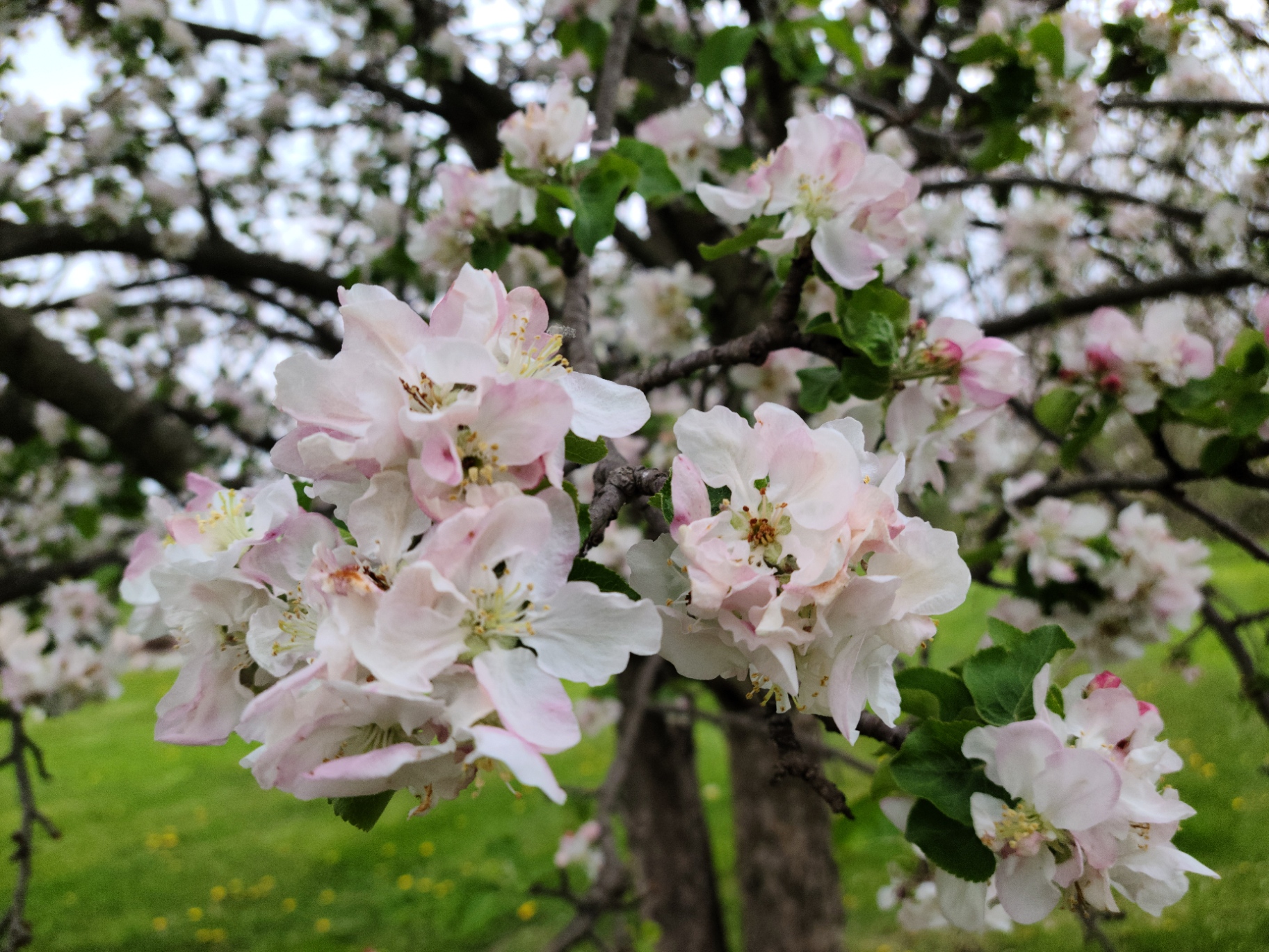May 2021 Gardening Advice

Photo by Jennifer Fairfield
submitted by Jennifer Fairfield, Garden Mill and Manchester Community & School Gardens
I got an email from DTE energy a week or so ago that said “Michigan Weather Can Be Unpredictable.” Talk about an understatement! Just to give you an idea of how “unpredictable” our weather can be, this year, the high temperature on March 1st was warmer than the high temperature on April 1st, and the high temperature on March 30th was also warmer than the high temperature on April 30th. I am hoping this trend doesn’t continue into May!
May, just like every other month in Michigan, can definitely be "unpredictable," but it is also the month when gardening really gets going around here. So, get your tools ready, and get to work - there's lots to do this month!
Vegetables and herbs:
- You can still plant potatoes and onions early this month. Vegetable seedlings that also can be planted early this month, if you haven't yet, include broccoli, cabbage, kale, and head lettuce.
- Parsley, thyme, sage, and oregano seedlings can be planted early in the month. Other herbs, such as rosemary, basil, cilantro, and dill should wait until all danger of frost has passed. Basil especially should not be planted too early, as it doesn’t do well in temperatures under 50°.
- Seeds to plant early this month, if you haven’t already, include leaf lettuce, spinach, carrots, radishes, and beets. Corn can go in soon, but beans should wait until about mid-month, if the soil has warmed up enough. It’s important to plant seeds when the soil temperature is right for that type of seed, because every seed has a temperature range at which it will germinate. If the soil is too cold or too hot, you’re just wasting the seeds. The University of California’s Extension Service has information on germination temperatures for many vegetable garden plants. A soil thermometer takes the guess work out of getting the timing right.
- If you are starting your own plants, it’s time to start your squash and cucumber seeds indoors, so that they are ready to transplant outside at the end of the month. However, seeds for these and others, such as pumpkins and melons can be planted directly in the garden around the end of the month, and will do just as well.
- Once the soil has warmed up to above 60° and nighttime temperatures are consistently above 50°, it’s safe to plant tomato, pepper, eggplant, squash, and cucumber seedlings. Around here, that typically means about the time of Memorial Day weekend. If we get an early warm-up, you might be able to get some of those in sooner – just be sure to have something available to cover them with if we get a cold snap, as low temps can hurt these tender plants. Lightweight frost blankets are best – they keep the warmth in without being so heavy that you risk harming the plants.
Flowers:
- Now is a great time to get a jump on weeds, before they get out of control. The rain that we are expecting early in the week should make pulling weeds a lot easier, which is really good, because I have a bunch to get out of my flower beds!
- Most perennials can be planted any time now – sooner is even a little better than later, as you want them to have a chance to get well-rooted before the hot, dry weather sets in. This is also a good time to divide late-spring and summer-blooming plants. Plants that have outgrown their space or are getting bare spots in the centers should be dug up, divided, and replanted. However, if the plant is in flower now, wait until fall to transplant it. If you’re not sure how to divide plants, Fine Gardening offers some tips to help.
- It’s still a little too early to plant most annuals. By about mid-month, it should be OK, depending on the temperatures. Remember, all the annuals available now have been living in heated green houses. Putting them in the ground right now would only shock them and slow their growth. Like our warm-weather veggies, for annual flowers, it’s better to wait until the soil has warmed up to at least 60° and nighttime temperatures are consistently above 50°. Planting of annual seeds should wait until the danger of frost has passed.
- Patio pots and hanging baskets can be put out now, but you will want to bring them inside at night (an attached garage is fine), if the temps are dipping below about 40°. Keep an eye on watering your container plants – if it’s sunny and/or windy, they will dry out more quickly than plants in the ground.
Trees and Shrubs:
- Now is a good time to plant new trees and shrubs, while it’s still pretty cool and we’re getting regular rain. The most important thing you can do for your trees and shrubs is to keep them well-watered when mother nature isn’t, especially for the first couple of years after they are planted, while they get their roots established.
- Once your early-blooming shrubs, such as forsythia and quince, have dropped their blossoms, you can prune them back for better growth in the future. Letting them go without regular pruning will cause them to have leaves and flowers on the ends of long, mostly leafless branches. An annual pruning will keep them looking full and give you more blossoms.
- Speaking of pruning, May has been designated as Oak Wilt Awareness Month in Michigan, and one of the most important things to know about it is that you should not prune Oak trees between April 15th and July 15th. If you have oaks on your property, and you’re not familiar with Oak Wilt, it’s something you will want to learn about, because of the danger it poses to oak trees. Michigan State University’s Extension Service has published information on the causes of the disease, as well as tips on how to help prevent its spread.
- Mulch is the second most important thing you can do for your trees and shrubs (second only to watering), because it helps to keep the soil around the roots moist and helps to maintain a more consistent soil temperature. Don’t mulch too soon though, as that will keep the soil cooler, which can slow down growth. When you are mulching trees, avoid creating mulch “volcanoes” (piling mulch up around the trunk), which can slowly kill your trees. Click here for good tips on mulching from the MSU Extension.
Birds:
- If you haven’t gotten out your hummingbird and oriole feeders yet, don’t delay any longer! They’re here, and they’re hungry from their long trip north.
- Keep your seed feeders full at this time as well. Our birds are busy building nests, laying eggs, and raising baby birds – all hard work that requires lots of nutrition. Yes, there are plenty of insects out there now, but providing easy access to food will get them to stick around your yard, which means lots of entertainment for you. Just be sure to keep your feeders clean. Cleaning them regularly with a 10% bleach solution helps to reduce the chances of disease among the birds you are attracting to your yard.
- It’s also time to put out bird baths, if you haven’t already, and fill them up. Again, keep them cleaned out to prevent disease.






You must be logged in to post a comment Login